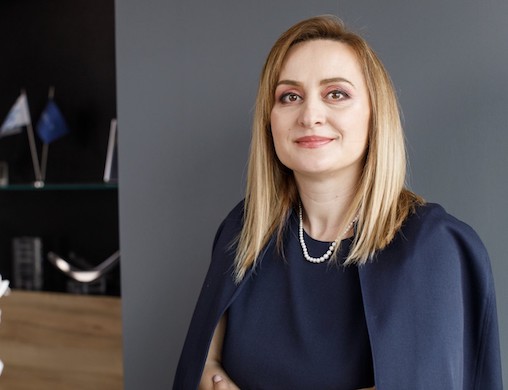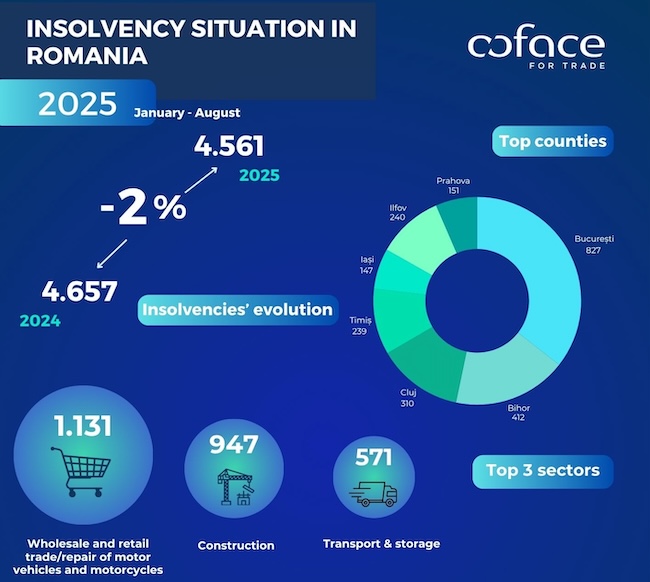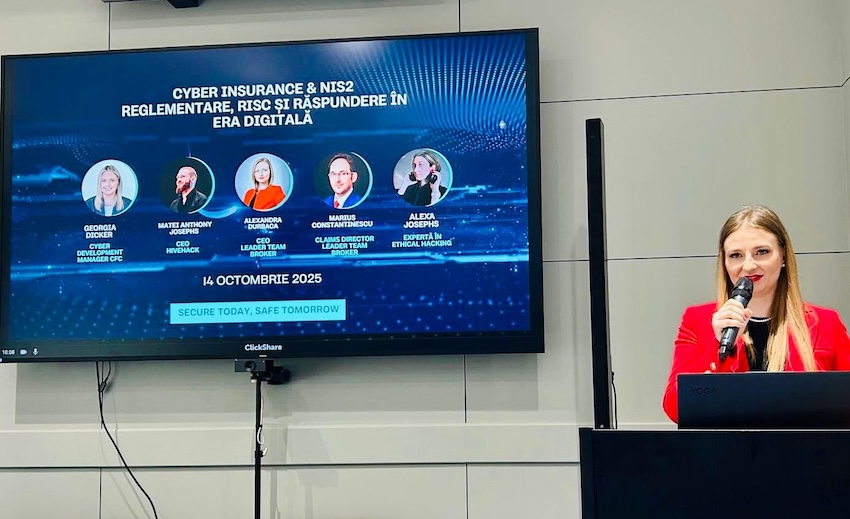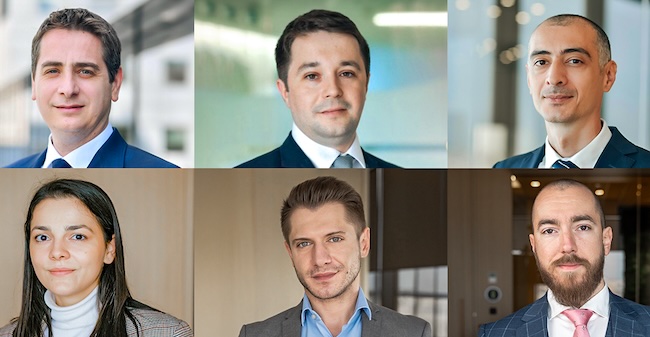Over 500 million EUR of increased funds for companies that want to access up to 50% investment financing of at least €1 million

The companies active in Romania, be they start-ups, SMEs and group of companies or multinational companies, have access to non-reimbursable financing of over 2 billion euros for direct investments by the end of this year, represented either by European financing or by state aid, shows a REI analysis, a consultancy company specialized in attracting non-reimbursable funds.
The year 2021 has been a transitional year between the two European funding programs 2014-2020 and 2021-2027, with resources largely stemming from the re-allocations of funds from the older financing axes, but also a pre-financing for the next financing period, which will make available about 80 billion euros to Romania
Agriculture, production or construction sectors are only some of the financing sectors in the forthcoming period, with total allocations of over 2 billion euros, in projects for which a grant of between 50 and 95 percent of the investment value can be obtained.
The European Commission has recently announced that the funds are immediately available to finance more investment projects, and the companies concerned have a number of financing pits that can help businesses develop.
- Action 4.1.1 POC – investing in productive activities under priority Axis 4 – supporting the improvement of the crisis-related effects in the context of the COVID-19 pandemic
Action 4.1.1. "Investing in productive activities" is a funding axis from React EU, with a total allocation of €358 million, for which the European Commission (EC) has validated the budget for our country. The Guide was in consultation by the end of September and the final Guide is expected in early November, which will announce the final terms and opening date of the session, most likely in early December, on the “first come, first served” principle.
“This funding level requires applicants to have seen a decrease in turnover on the 2020 balance sheet compared to 2019. The scoring grid was even about a 30% drop and more than 90% investment in environmental components. Given the high percentage of non-reimbursable financing - of 85% - for medium-sized companies, 90% - small companies and 95% for micro-enterprises, as well as the fact that it is also granted in Bucharest, the purchase of buildings at 50% of the investment value and the maximum grant of 1 million euros is eligible, all of which make this financing project an extremely attractive scheme. We suggest that entrepreneurs start defining a series of potential investments, gather two offers for energy-efficient equipment, renewable energy to serve the investment, prepare the urban planning certificate and an estimate for a "green" building, if they want to apply for construction funds, as also specified in the Guide published by the Ministry of Investment and European Projects”, stated Roxana Mircea, REI Finance Advisors partner.
According to the European Commission, the Scheme will be open to SMEs active in sectors particularly affected by the coronavirus epidemic, such as manufacturing, construction, wholesale and retail trade, repair of motor vehicles and motorcycles, transport, storage, etc. To be eligible, the companies must have been established in Romania by 31 December 2018 and must have recorded operating profits during 2019. The scheme is expected to benefit approximately 4,000 companies.
Companies are eligible regardless of turnover or number of employees. Moreover, there is no correlation of the turnover with the amount requested. Therefore, a company with a turnover of RON 10,000 can claim EUR 1 million if it has recorded a decrease in turnover, and if it proposes a “green” investment, it will get a score of at least 70 points and the project will be able to be submitted within the first minutes of the opening of the session.
- State aid covered by GD 807/2014 – up to 50% financing for projects of at least EUR 1 million
GD 807/2014 regulates a State aid scheme, managed by the State aid Department of the Ministry of Finance, which provides non-repayable financing for investment projects of minimum RON 4,5 million (about EUR 1 million), amounting to 10%-Bucharest, 35%-Ilfov county and West (Timis, Arad, Caras-Severin, Hunedoara counties) and 50% - rest of the country.
Both start-ups, which have no more than 3 deposited or existing financial statements and large companies, which have made a profit in one of the last 3 years and are not in difficulty can apply for funds.
Moreover, the allocation on this Scheme was supplemented by an additional EUR 550 million last summer, via the GD 760/2021, reaching a total budget of EUR 1,45 billion,and construction companies that can now also purchase excavator equipment, asphalt stations, and finishes that they can move to the work sites have been included on the eligibility list.
“The session on this financing project is open and projects are submitted to the Ministry of Finance, the State aid Department, both in physical and online format, and financing agreements can be obtained within 3-6 months. Expenditure on the purchase of equipment or the construction of premises for production or provision of services is eligible: storage, medical clinics, hotels etc. The main obligation of the beneficiary companies under GD 807/2014 is to pay in 5, maximum 7 years - taxes (with the new strict commitment on the project, pro-strict tax on the project and local budget taxes on the financed building) equal to the grant received. In order to take into account new employee taxes, it is also necessary to maintain the average number of employees over the past 12 months. If at the end of the 5-7 years the company does not pay fees at the same amount as the grant, it must strictly return the unpaid amount, with 1,7% interest”, Roxana Mircea pointed out.
- European Funds for Sub-measure 4.1 "investments in agricultural holdings" and 4.2 - "Support for investments in the processing/marketing of agricultural products"
Sub-measure 4.1 "Investments in agricultural holdings" is a financing axis managed by the Ministry of Agriculture, with an estimated allocation of EUR 760 million, and contains 8 sub-measures providing up to 90% financing of the projects, from the purchase of agricultural tractors and machinery to the construction and modernization of livestock farms, slaughterhouses etc.
Eligible are: Self-employed person, Individual enterprise, Family enterprise, Joint Venture — CRS, Limited partnership company — SCS, Joint stock company — SA, Joint stock company — SCA, Limited liability company — SRL, Private equity company, Research and Development Institute, as well as R&D and Teaching centers, resorts and establishments, including universities with research and development and teaching resorts (defined according to the national legislation in force on their organization and functioning) in the agricultural sector having legal personality, whether governed by public or private law.
Under the 8 sub-measures, different types of investment are financed:
- P 4.1.1 - Simple purchases of agricultural machinery and/or irrigation, drainage, farm-level (vegetal) drainage - the package applies only to existing farms;
- P 4.1.2 - P 4.1.3 - Farm conditioning and processing and marketing-modernization farm (vegetal and zootechnical, except for vegetables and potatoes) – these packages apply only to existing farms;
- P 4.1.4 - Young farmers - machinery purchase – the package applies only to existing farms;
- P 4.1.5 - P 4.1.6 - Investments in livestock (primary production, packaging and marketing) – NATIONAL and MOUNTAIN - these packages apply to both existing and newly established farms;
- P 4.1.7 - Vegetables (including in protected areas) and potatoes (primary production, conditioning and marketing) – establishment, extension, modernization - the package applies to both existing and newly established farms;
- P 4.1.8 - Conditioning, processing and marketing - vegetables, potato- modernization farm - the package applies only to existing farms;
- Sub-measure 4.2 - “Support for investment in processing/marketing of agricultural products”.
The filing sessions are open for 3 months, but each company has only one month to submit the project, depending on the score.
On sub-measure 4.1 the session opened on October 25 and projects with a minimum of 90 points can be submitted, from November 25 projects can be submitted with a minimum score of 60, and from December 25 to 25 January 2022 - projects with a minimum of 30 points.
On the 4.2 sub-measure, the session has already opened on October 8th and will close on January 7th, with each applicant having a dedicated month to submit the project, depending on the score.
"We recommend companies to prepare projects quickly and rigorously, together with a specialist consultant who takes a contractual responsibility for submitting correct and complete projects, to submit the project on the first day or in the first minutes/hours, especially where we have part-time sessions. The current allocation of around EUR 3 billion for agriculture on all measures, including infrastructure for agricultural roads and irrigation, represents about 35% of the future allocation through the National Strategic Plan (NSP), to be available from 2023. Therefore, companies with projects that will not enter the financial allocation have the possibility to resubmit their projects in the future", added Roxana Mircea.






